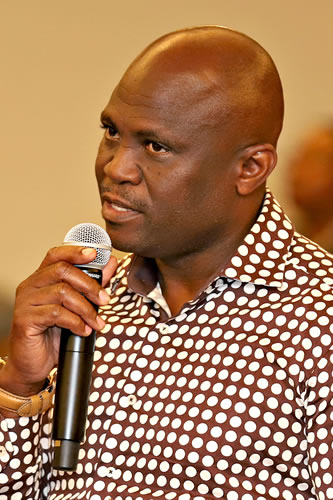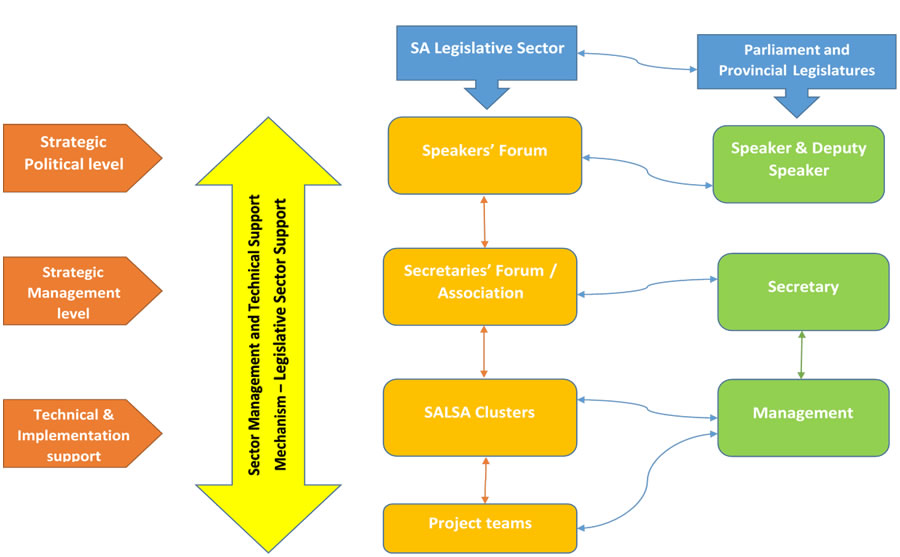Governance
 Speaker of the National Assembly: Ms Thoko Didiza |
 Chairperson of the National Council of Provinces : Ms Refilwe Mtshweni-Tsipane |
Through the Speakers’ Forum of South Africa, Parliament and the Provincial Legislatures resolved to organise as a sector and engage in efforts aimed at asserting the sector against potential threats to its independence. This has been done with due regard to the autonomous nature of the Legislatures.
At present the Legislative Sector includes the National Parliament of the Republic of South Africa as well as the Provincial Legislatures of the Eastern Cape, the Free State, Gauteng, KwaZulu-Natal, Limpopo, Mpumalanga, the Northern Cape, the North West, and the Western Cape.
During the third parliamentary term (2004-2009), there were more intensified efforts aimed at formalising the inter-parliamentary relationship of Parliament and the Provincial Legislatures. In 2007 the SA Legislative Sector proceeded to formulate a Policy and Strategic Framework to guide Sector work, to determine structures and priorities, and to focus their strategic planning and implementation as well as to monitor and assess progress.
The current Speakers’ Forum believes strong legislatures, and therefore a strong legislative arm of state, can be achieved through close cooperation and systematic implementation of common programmes throughout the Legislative Sector. The key challenge facing the Legislatures is to build effective institutions to enable them to deliver on the vision of the Constitution.
In a practical demonstration of the above belief the Speakers’ Forum of the 4th Parliamentary term signed the SA Legislative Sector Memorandum of Understanding in March 2010 thus illustrating the commitment of all the Legislatures to the Sector approach and collaboration.
SA Legislative Sector Policy
The Sector Policy identifies the following policy priorities for the Legislative Sector: Nation building; Building strong legislatures and the legislative sector; Deepening parliamentary democracy; Developing representative democracy; Oversight and accountability, Lawmaking and Public participation; and International relations and cooperation.
The SF of the 4th Parliamentary term has resolved that attention should be given to all the priorities of the SA Legislative Sector Policy.
Strategic Framework for the SA Legislative Sector
The Strategic Framework focuses on the below-mentioned key strategic goals and objectives for Legislative Sector development. The Sector strategic goals, as identified, have been considered and integrated into the new institutional strategies of individual legislatures for the new term.
- To deepen and entrench a people-centred democracy in South Africa – by deepening public participation and representation in the Legislative Sector, contributing to nation-building and ensuring the mainstreaming of gender and disability.
- To strengthen lawmaking and oversight capacity in order to ensure executive accountability – by ensuring effective lawmaking processes, and effectively holding the executive accountable through vigorous oversight.
- To ensure that the Legislative Sector institutions optimally carry out their mandate at political and administrative level – by building effective and efficient Legislative Sector institutions individually and collectively as a Legislative Sector and pillar of State.
- To fulfil and enhance the Legislative Sector’s role in the international legislative community by participating in the region, the continent and globally in order to strengthen the capacity of the Sector and to share knowledge and experiences with counterparts internationally.
STRUCTURES OF THE SA LEGISLATIVE SECTOR

South Africa continues to battle with the effects of the past racial, gender and socioeconomic inequalities. To this end the Speakers’ Forum has developed strategic frameworks aimed at effecting gender mainstreaming and addressing disability needs and mainstreaming in the Legislatures. These frameworks have been adapted and are being implemented by all Legislatures.
The following collective structures exist to direct and advance the work of the SA Legislative Sector:
- The Speakers’ Forum of South Africa
- Chairperson: Ms Nosiviwe Noluthando Mapisa-Nqakula, Speaker of the National Assembly, Parliament of the Republic of South Africa
- The Secretaries’ Association of the Legislatures of South Africa (SALSA)
- Chairperson: Advocate ME Phindela, Secretary to the National Council of Provinces, Parliament of Republic of South Africa
- Clusters of SALSA
- Cluster 1: Governance & Administration
- Cluster 2: Core Business
- Cluster 3: Sector and International Coordination and Engagement
- Cluster 4: Capacity Development and Knowledge Management
- Legislative Sector Support
- Executive Director: Ms S Schalk, Parliament of the Republic of South Africa
The governance diagram illustrated below shows the relationship between Speakers’ Forum, SALSA and its clusters and the role to be played by the Legislative Sector Support structure as the sector support and secretariat.

The Speakers’ Forum has developed various institution-specific strategies aimed at implementing modalities in various critical areas of legislative business. These include strategies and frameworks to improve the capacity of members and staff, and to develop national strategies to enhance public participation, oversight practices and other processes within the legislative sector.
South Africa continues to battle against the effects of the past racial, gender and socioeconomic inequalities. To this end the Speakers’ Forum has developed strategic frameworks aimed at effecting gender mainstreaming and addressing disability needs and mainstreaming in the legislatures. These frameworks have been adapted and are being implemented by all legislatures.
Some of the initiatives mentioned above have been developed with the assistance and funding support of the European Union. The Legislative Sector Support (previously called the Secretariat for the Speakers’ Forum) is tasked with implementing, monitoring and coordinate all the joint sector programmes. This has helped to enhance the sustainability and coordination of the legislative sector.
In essence, the development of strong legislative institutions helps to strengthen our constitutional democracy and to ensure service delivery.
